Your entry fees allow us to continue to feed our rescue animals and pay our vets who maintain their health and well-being.
Scroll below to see the types of animals you can expect to see at Splitters Farm.
If you’d like to assist us further, you can make a one-off donation or alternatively become a Rescue Squad Member and enjoy a number of member benefits.
‘Alice, Sahra & Loco’
Our three golden girls are our biggest rescues to date. Rescued from a property in Elbow Valley near Warwick, our team drove two solid days & nights to collect them and bring them back to their forever home at Splitters Farm. They were covered in paralysis ticks and in bad shape when we first met them in late 2023. They are approximately 4 years in age, love a kiss and are really affectionate. Just watch out for the camel breath.
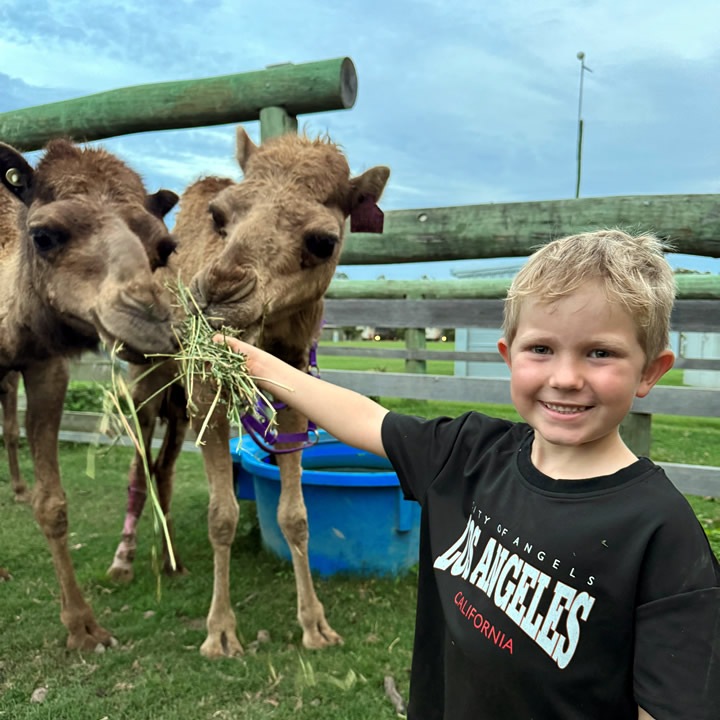
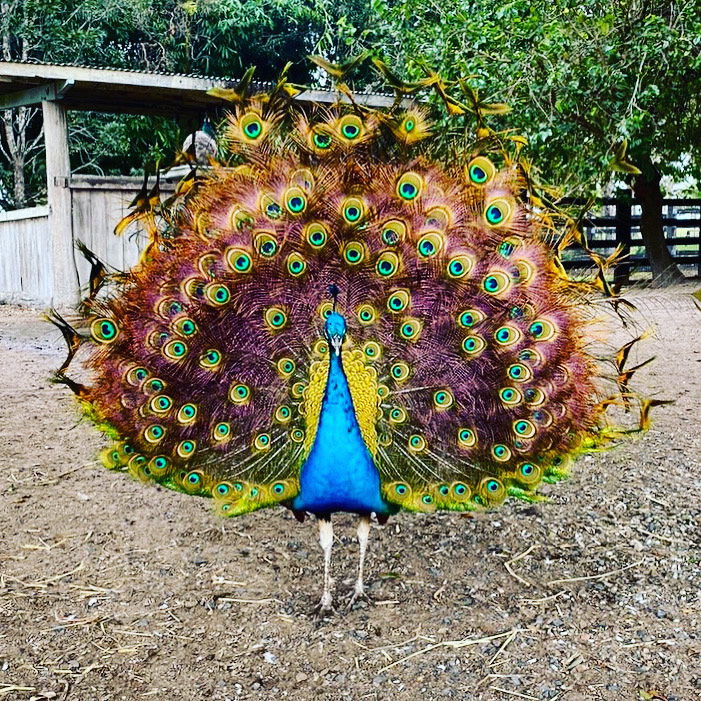
Or Peafowl as they are more commonly referred are from the pheasant family and their allies. Male peafowl are referred to as peacocks, and female peafowl are referred to as peahens, even though peafowl of either sex are often referred to colloquially as "peacocks".
Splitters Farm has several of the blue or Indian peafowl, the species originating from the Indian subcontinent. Male peafowl are known for their piercing calls and their extravagant plumage. The latter is especially prominent in the Asiatic species, which have an eye-spotted "tail" or "train" of covert feathers, which they display as part of a courtship ritual.
Peacocks are incredibly vain and love their reflection. As they don’t carry a mirror, they seek out glass, solar panels and the sun roofs on cars to try and get a glimpse of how impressive they are which is why they becomes a pest for some homeowners in suburban areas.
We have seven horses at Splitters Farm. Every new horse costs us $1500 the week we take them in, between having their vaccinations, microchipping, worming, feet and teeth checked. Horses are incredibly intelligent but take a lot of looking after which means lots of $$$. They need a pedicure every 2 months and can get very sick if they eat the wrong food. Horses are unfortunately also the biggest victims of drought. They eat 4-6 times what a cow will, which is why so many farmers move them on as they attempt to salvage whatever grass / crops they have left.

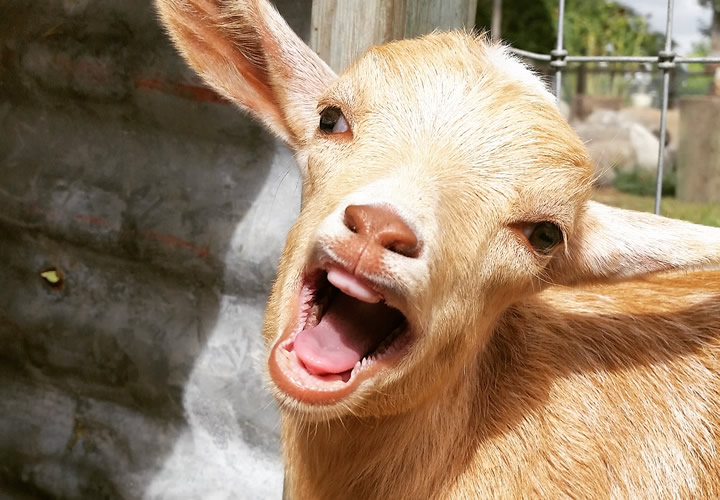
Goats are extremely sociable creatures and cheeky as hell. They will, quite literally, eat the shirt off your back if given the opportunity which is why they are great weed eaters. Just do not let them near your washing line. Because goats are so sociable you can easily tell if one is ill or about to give birth as they will normally go off on their own for some ‘alone time’. Our tribe of misfits have come from all over the place but most because of a change of their owners’ circumstances. We’ve lost count of how many we have on the farm but they are by far our most popular with most.
Our 3 alpacas are the guardians of the goat herds. They look after the young like Nannies and let us know if there is danger to the group such as wild dogs. Alpaca’s are pregnant for 11 months and normally give birth to a single baby. Ours are a little skittish and do not like to be touched on the tops of their heads. Although Alpacas have a bad reputation for spitting, ours are very polite. To establish if an alpaca is pregnant you can conduct what is called a ‘Spit test’. It’s where you put a male and female in the stable (previously serviced) and if the female alpaca spits and kicks at the male, then she’s pregnant however, if she submits to him within 30sec, it’s a good indication that she’s not pregnant and you can just leave them to it.
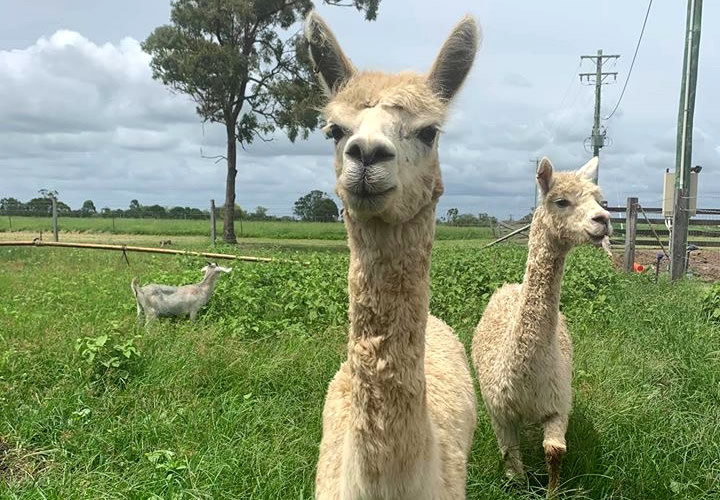
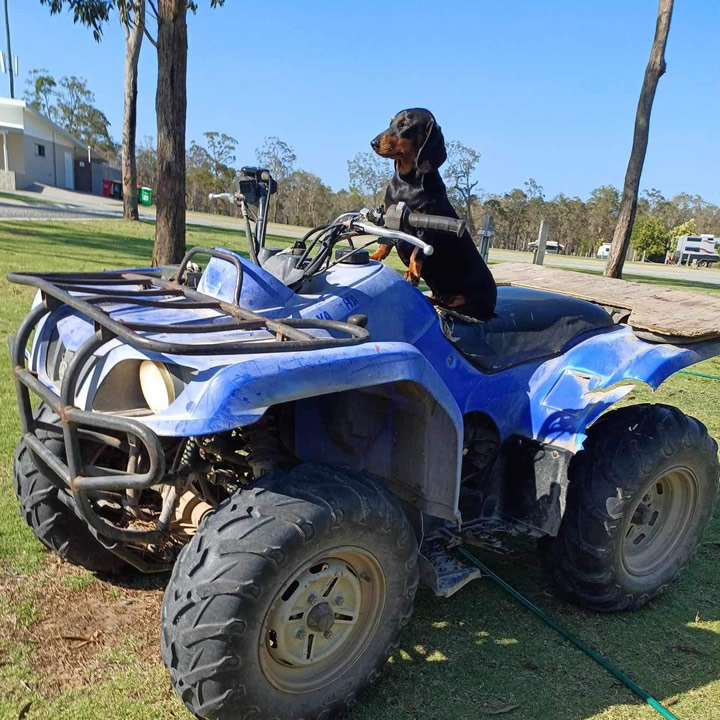
Our family’s dachshunds are called ‘Doug & Lulu’
Douglas is a quiet soul who thinks he’s actually a sheep dog. He loves nothing more than chasing the sheep. Lulu is a true farm dog who truly believes she owns the farm. A lunatic by name and nature, she is an absolute terrorist who barks at everything and everyone. These two suffer from ‘typical little dog syndrome’.
We have many rescues that make up our dorper herd. Dorper’s self-shed meaning they do not require shearing which is a great feature of this breed. They simply rub their winter coat off against trees or up and down on the fences.
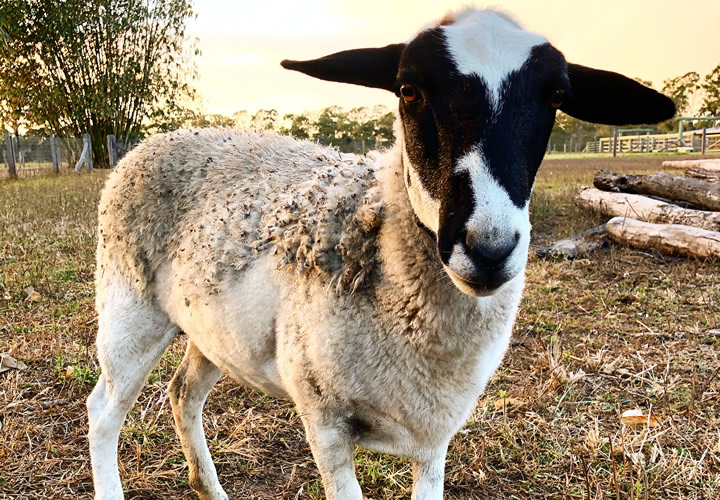
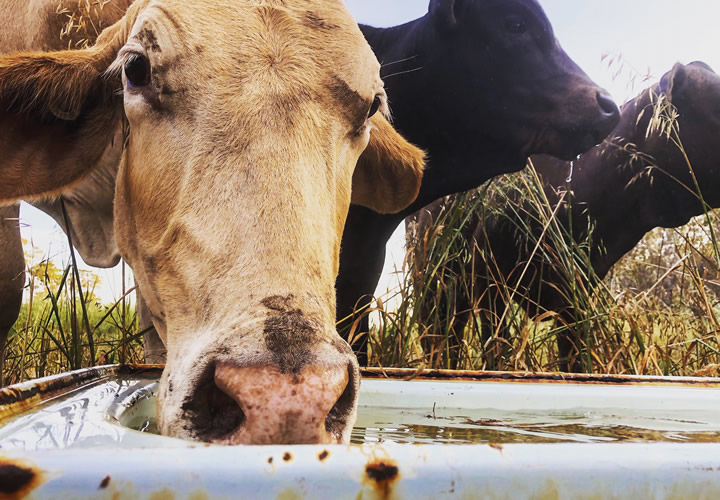
You may already be aware that we are a working cattle farm with approximately 40 head of cattle at any one time. However, our very first rescue animals at Splitters Farm were a herd of seven Dexter cows (half sized cows that are good at escaping paddocks). They came from a property west of Gin Gin that had run out of water and are represented by the 7-stars in the Splitters Farm logo. We’ve since sold that little Dexter herd to a lovely old couple (with better fences) and we now like to call ourselves ‘serious cattle farmers’ because our cows are our livelihood. They are currently separated into two herds, of which a majority are Droughtmasters and Brahman.
In the big shed are our original ‘Point of Lay’ chooks or ‘Isa Browns’ who came from chicken farms that no longer wanted them because they were not at their laying peek anymore. The problem though with chickens raised in commercial environment, such as caged/battery egg factories, is they rarely tend to develop maternal instincts or get ‘clucky’. Therefore, we take the fertilised eggs off our ladies and put them in an incubator. The eggs rotate in an incubator for 21 days before they hatch out baby chickens. The eggs need to be under the right temperature and humidity conditions to hatch as the humidity softens the egg so that the chick can break through the shell. We tend to let our roosters free range to prevent them fighting with other males.
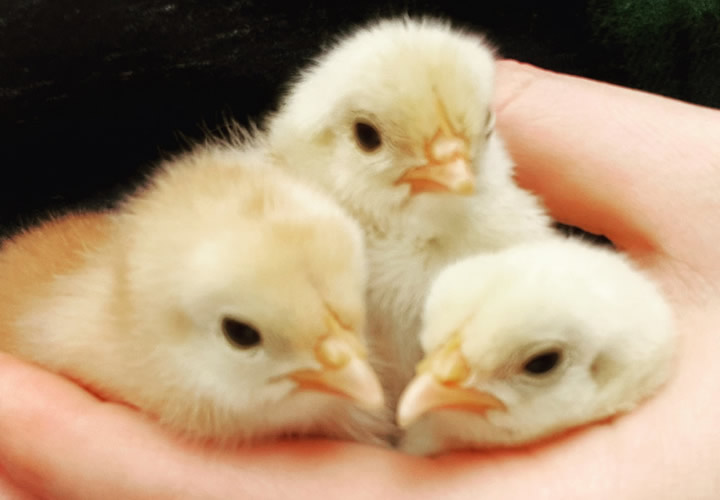
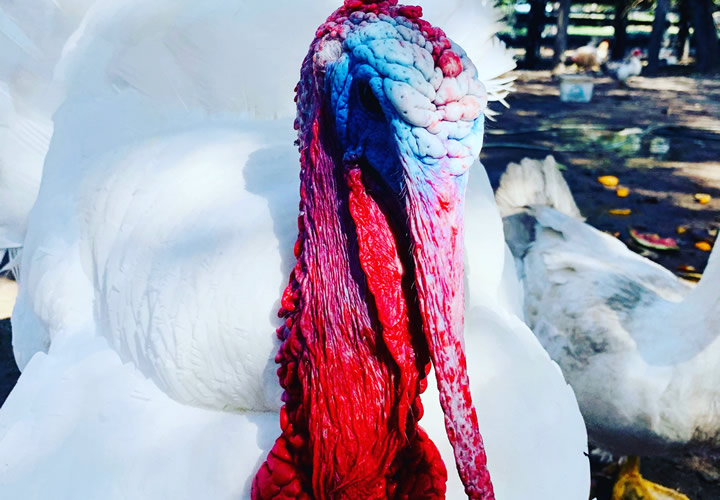
Do not let their size scare you, our four large turkeys are not vicious however the boys sometimes fight during breeding season. Female turkeys prefer males with long ‘snoods’ (red skin around their head). Snood length can also be used to predict the winner of a competition between two rival males.
Geese can chase and give a wicked pinch if they are being territorial. Best way to avoid being chased is not to turn your back on them and stand your ground. Our gaggle of geese came from two families in South Kolan. Some came to be here because their former owners had too many geese already and needed them gone; the others came to us because a lady had to flee the area quickly due to domestic violence.
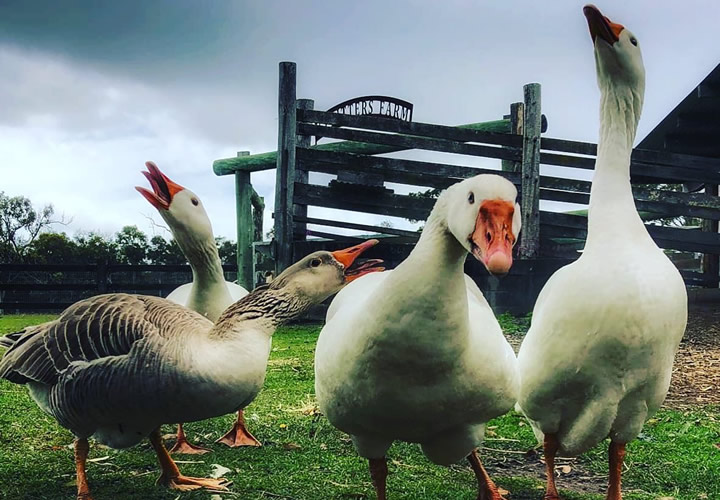
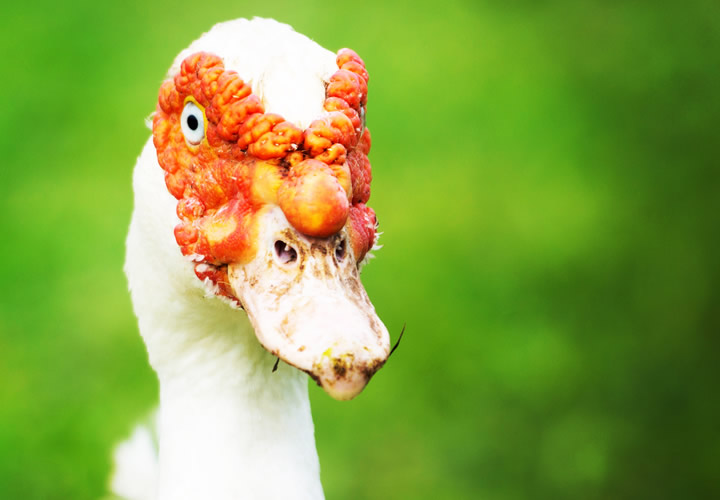
Most of our ducks are Muscovy’s. The Muscovy duck is a large duck native to Mexico and Central and South America. Our ducks have come from several places but most because a couple had a mother duck in a rental property in Avoca who had 30 eggs which all hatched at once. Their landlord was not a happy camper and they had to go. We have so many at Splitters Farm we have lost count.
The Black and white spotted birds wandering around the property are called Guineafowls. Guinea’s are known for being ‘natures pest control’. They pick bugs off our plants in the orchard, eat ticks and even kill baby snakes. They have a loud and sometimes obnoxious call which is how you distinguish the girls from boys as they sound quite different. We collect their eggs from around the farm and put them in the incubator and sell them at a local produce supplier as young ‘keets’ so other farmers can reap the benefits of these noisy little birds.
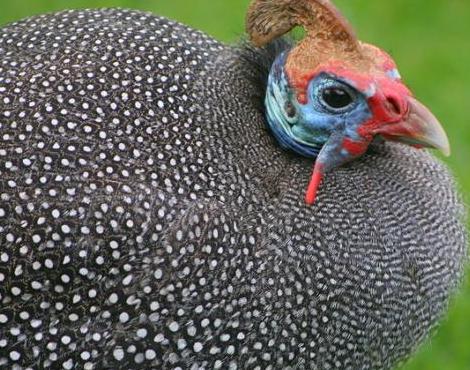
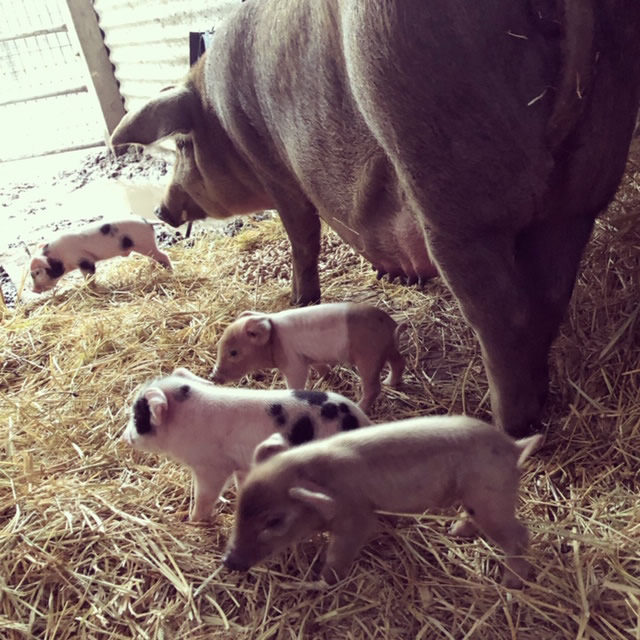
Down the end of the lane you will find the pig pens. Pigs can have up to two-three litters each year, are highly intelligent, love to dig and find weaknesses in the fences. Hence why our pig paddock has an electric wire right the way around the bottom of it. This white wire is as much to keep our lot in, as it is to keep the wild pigs out. Wild pigs can spread disease. Some farmers even put rings in their pig’s noses to stop them from digging. Pigs will eat just about anything, even their water troughs which is why we supply ours with fresh drinking water via metal ‘nipples’ attached to the enclosures. Even though our big pigs are rescues, our babies at Splitters Farm are sold to other families who want a pet pig. Pigs can have up 10 piglets in each litter ...that’s a lot of mouths to feed.
Splitters Farm rely on the in-kind support & financial backing of the following corporate sponsors:

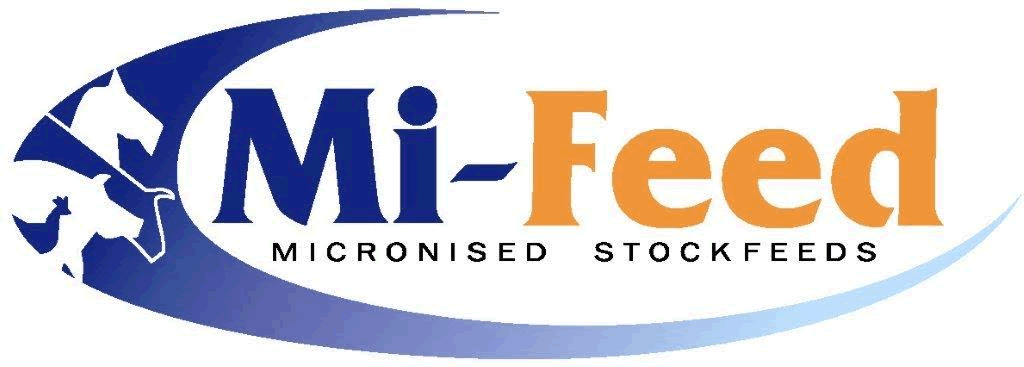
Sign up to receive discounts, special offers and news about Splitters Farm! (You can unsubscribe at anytime).
If you have any enquiries or bookings for accommodation, activities or food, please type your enquiry here. All fields are required.